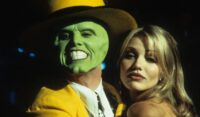I love The Phantom Menace. However, I do have a complicated history with it. The internet was still in its (relative) infancy in 1999, and I didn’t spend all that much time on it. Aside from browsing Buffy the Vampire Slayer fanfic and Ain’t It Cool News, if I did go online, it was for up-to-date news. In addition, I went to a high school miles away from where I lived, so I didn’t see many of my friends during the summers.
This is all to say that I wasn’t aware of the film’s harsh backlash until a good month or two after it came out. I mean I was aware of some reviews, as well as a voice here and there after a screening talking about how the film had too much CGI, but that was it. My memory of that first showing I went to was clear. The crowd I saw it with seemed to love it. I know I did, and I know my brother, a Star Wars fan pretty much his entire life, loved it, too.
At the time, I understood three things:
- People didn’t like Jar Jar Binks (or downright hated the character)
- People didn’t like Jake Lloyd’s performance as Anakin Skywalker
- People had issues with the amount of CGI in the film
These criticisms are fair because it’s all subjective. Liking or disliking a character, performance, or use of special effects is all a matter of personal taste. Still, as time went on, it seemed the world treated such criticisms (as well as others) as fact, which they are not. I’m aware of many articles and video essays that seemingly prove that The Phantom Menace is a bad movie, but ultimately, it’s all opinion.
Still, up until a few years ago, I never wanted to let anyone know I loved the film, because as the internet grew, so too did animosity toward a lot of things. Are people free to hate a movie? Of course. Are people free to be hurtful to one another? Unfortunately, yes. From critics to comedians to people I admired, whenever the subject of the prequels got brought up, so too did the negativity.
Even when The Force Awakens came out in 2015, part of the hype was tied to the idea that the prequels were not good movies. At a certain point, I started to genuinely wonder if there was something wrong with me. Not only did I love The Phantom Menace, as well as the following two prequel films, I seemed to love a lot of things that the majority claimed were awful. For a large part of my life, I tucked my tastes away, careful to only bring them out when I was sure the other person was into the same thing I was into. I worried that I would lose credibility if others knew what I loved.
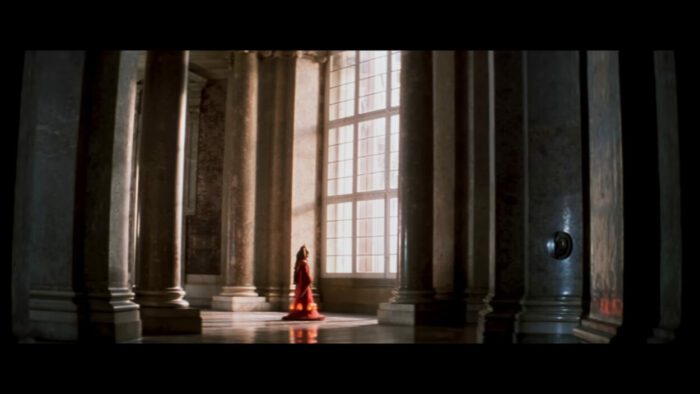
In 2009, when the film turned 10, I rewatched it for the first time in years. I had been convinced that it was the lesser of all (at the time) six films. However, as I watched it on Blu-ray, I realized that I had been correct in my original assessment. The Phantom Menace, to me, was not a bad film. There were a few bad things in there, but not much more than the average movie, even the average great movie. I will say, those three central criticisms stood out, though: character, performance, and CGI.
I understood why people were negative towards Jar Jar, even as I liked the Gungan. Many of the performances felt flat, especially Jake Lloyd’s. As for the CGI, it sometimes looked amazing (the pod race), and other times not so much (Qui-Gon running alongside creatures on Naboo). The thing is these three criticisms don’t bother me anymore. Perhaps it’s growing older. More than likely, I’m a different enough person now.
When The Phantom Menace turned 20 in 2019, that all changed. Thanks to social media, I became aware of others like me who loved the film. They seemed like normal people, a lot of them kind and smart. Perhaps there wasn’t anything wrong with me. We’re all entitled to our opinions, but I honestly don’t have it in me anymore to listen to someone else’s opinion. As John Waters says regarding opinion pieces, “I know I’m right.”
This past May, I went to see The Phantom Menace on the big screen once again. My opinion of it had not changed. Honestly, I feel like I appreciate it more now in 2024 than I did then. As I look back at the films from 1999, I believe The Phantom Menace is no outlier. This film is not safe. It’s weird, like very weird. To me, it uses the large, blockbuster canvas to tell a very interesting political and social story.
It’s easy to say the movie was all about selling toys, given the massive marketing push that plenty of others have discussed both recently and in the past. Alas, that was 25 years ago. Sure, there are still tie-in products being made, but I take the movie seriously now, just as I did in 1999. I firmly believe a film can be both a product intended to make money and a work of art meant to entertain and make people think. I can see why people would scoff at such a notion, given the poop jokes and odd accents in the film.
However, while others find fault in the political aspects of the film, I find those same elements to be some of the most interesting things about The Phantom Menace. If George Lucas was all about merchandising, he most definitely wouldn’t have made trade disputes and political corruption central to the story he told. It’s fair if one wants to call this stuff boring, but it’s not safe. Lucas could’ve taken the easy route and just told a surface-level story about good guys and bad guys.
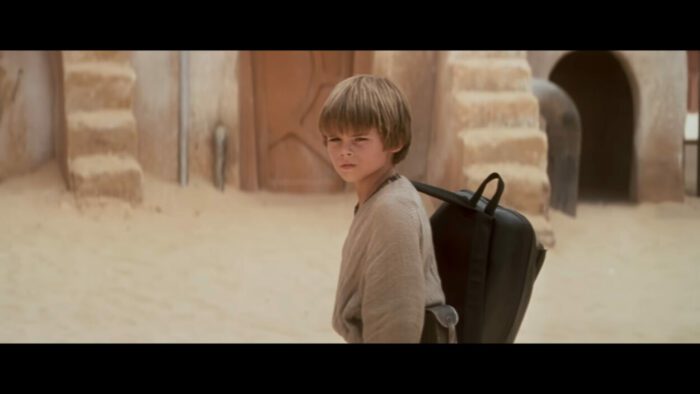
Rather, Lucas decided to take what we already knew and deconstruct it. The Jedi, to me at least, had always seemed like the ultimate good whenever I watched the original trilogy growing up. Now here they were–structured, institutionalized, and cold. It was easy to see why Qui-Gon was the way he was, and eventually why Anakin would prove frustrated with the Jedi (among other things, of course). It turns out, the Jedi weren’t perfectly good by any means.
Neither was the Republic. It would be fair to assume that if the Empire were the bad guys in the original trilogy, whatever came before that would be the good guys. However, this was far from the reality Lucas created. In The Phantom Menace, we see a galaxy-wide government that has become relatively useless due to bureaucracy and supposed corruption. Then, and most certainly now, it’s interesting to me that Lucas chose to tell several stories in the prequels, rather than movies about the good side and the bad side.
There’s the story of Anakin Skywalker, yes, but there’s also the fall of the Republic and the rise of Emperor Palpatine. More specifically, if we look past the Jedi, the force, and the science-fiction/fantasy elements, the prequels are about democracy can give way to fascism. This is not an original reading of the film, nor would I categorize it as anything other than surface-level, but it’s something that genuinely sells me on the prequels. And definitely on The Phantom Menace.
While so many have made arguments over the years criticizing the politics in the first film, I’ve always held firm that it’s some of the best stuff in it. It’s more than fair to say that while the attempt is fine the execution doesn’t work, but I simply disagree. Rewatching it recently, I noted just how at the forefront politics are in The Phantom Menace. From the opening crawl to Queen Amidala’s arc, as well as even Jar Jar Binks accidentally bringing the Naboo and the Gungans together, Lucas understood how what an important part politics plays in everyday life.
Lucas also understood how a fascist leader can take power. Once citizens of a democracy become disillusioned with the system, they are much more likely to hear how better things can be from an individual who is telling them everything they want to hear. All that needs to be done is to give complete control of the system to this one person. We see this in Revenge of the Sith, but in The Phantom Menace, we see the early steps Senator Palpatine takes to ensure his nefarious plans come to fruition.
He even manages to convince the Queen to call for a vote of no confidence, which gives him the opportunity to seize the position of power that will one day lead to emperor. He does this by being loyal, mild-mannered, kind, and giving the air to someone who believes in democracy but sees a need for change. Some future dictators don’t need to be so blunt with their fascist beliefs. It’s simply enough for them to exploit the genuine outrage a citizenry has toward their government.
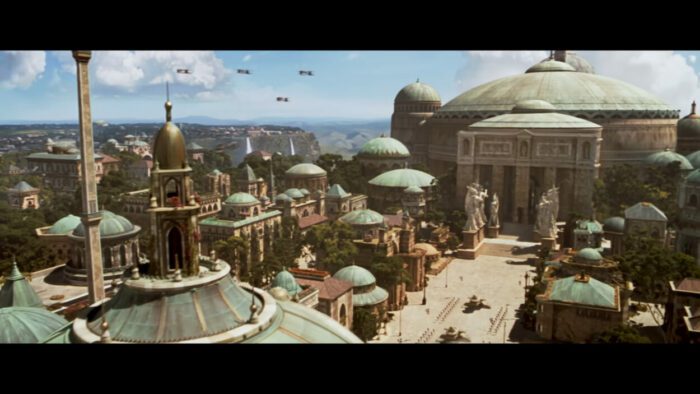
This leads to the second idea, that The Phantom Menace is about how individuals in a society treat one another. Unlike the politics stuff, this isn’t so front and center, but it’s there throughout. From Obi-Wan’s comments to Qui-Gon concerning Jar Jar and Anakin to Obi-Wan telling the leader of the Gungans that his people and the Naboo “form a symbiont circle,” that “[w]hat happens to one…will affect the other,” it’s there.
One doesn’t even have to dig much to find evidence in Anakin’s story. He and his mother are slaves on Tatooine, and while that’s bad enough, Padme didn’t know such a society existed and Qui-Gon and Obi-Wan, part of the group that is supposedly the guardians of peace and justice, don’t seem to want to change things. To be fair, Padme shouldn’t be expected to know what goes on in every corner of the galaxy, just as it’s okay that we’re unaware of every atrocity that occurs around the world.
Also, Qui-Gon and Obi-Wan aren’t required to do anything. How exactly would they even go about it? Still, regarding the Jedi, I believe Lucas wants us to question why they don’t do more in the galaxy. Is it because a Jedi needs to know that horrible and terrible things happen and that a Jedi must accept such things? Is it because the Jedi are run by a council that sits in a tower that, while not ivory, is clearly meant to show that they are above others?
I believe Lucas wants audiences to question our leaders, whether they be those in government or religion. It cannot be enough to question them, though. Questioning the Republic opened the door for Palpatine to take power. As for questioning the Jedi, there, too, opens the door for Palpatine. So, what’s the solution? It involves action.
One way to read Queen Amidala’s action in the film’s final sequence is story-centered and action-oriented. It’s nice to actually see characters do something, other than stand around. On the other hand, I believe it’s meant to show something more meaningful. While so much of the government in the Republic does nothing, here is a leader of a planet literally taking control of said planet back so that she can free her people.
It’s also interesting to me that the Queen of Naboo is a teenage girl. While the older people in the Republic do nothing, it’s a young person who saves Naboo. Hell, even Anakin is the one to help save the day in the space battle. Morever, it’s Obi-Wan who defeats Darth Maul, not his master Qui-Gon. I’ve always felt this to be intentional. While the original trilogy was partially about the younger generation fixing the mistakes of the previous one, the prequel trilogy starts things off by reinforcing the notion that young people get shit done.
By extension, as these characters age in the prequels, they make the mistakes that the young people in the original trilogy had to fix. Even as Lucas aged, he understood that young people are who we should be looking to fix our mistakes. I, too, was a young person once, and I remember how it felt to watch older people in power mess things up. As I’ve grown, I see that younger people are having to clean up after my generation now. They’ll grow up, too, and the next generation will do the same.
We all co-exist, whether we want to or not. Some of us look strange or talking funny, but we’re individuals with our own minds and our own choices. That is not to say that the Trade Federation is the same as the Naboo. One is clearly the aggressor, which makes me see them in a different light. However, it is not enough to see things as black and white; good guy and bad guy; Jedi and Sith; or, Gungan and Naboo. It’s about how we connect to one another.
The goal is not a utopia, which is impossible. It’s not even tolerance. What The Phantom Menace tells us is understanding how everyone has their place, but that we have the ability to help one another, just as we have the ability to hurt. The default of all life is choice. We can choose to hurt or choose to help. Whether it’s institutional, generational, or action, we can do something.
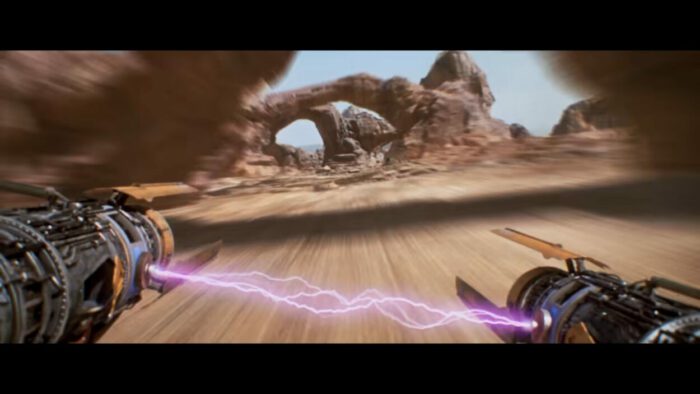
It’s been 25 years since The Phantom Menace was released, and you’re free to not like it. To this writer, the film works because of what it has to say about politics and society. On top of that, I love the characters, the performances, and the effects now. The characters have become more interesting the more I see what’s happened in the world since. The majority of this article is about that.
As for the performances, Ahmed Best is frankly outstanding. One cannot hate or be annoyed at a character if the actor didn’t sell it, and Best sells it. Yes, the effects team deserves props, but Best brought Jar Jar to life. I’ve never had a problem with the character, and I don’t care if I’m the only one. As for Jake Lloyd, I’ve gone from not liking his work, to being lukewarm on it, to actually liking it.
Seeing the film recently, aside from “Yippee!” I don’t have anything negative to say about Lloyd’s performance. Not every performance is the greatest performance ever. He does a good job. Not to mention, he does his best with that line, and I don’t see another child actor selling that damn line any better than he did.
The CGI is of the time, but it’s still mostly impressive. I have always been in awe of the pod race sequence. Not before or after, though. I’m talking about the actual race. The effects and the sound (the sound!) are astounding, especially in a theater, and it’s a sequence that looks better than most of what I’ve seen in a movie in a good decade. The Gungans aren’t perfect, but the battle droids still look great, as does the space battle at the end.
George Lucas took a lot of heat on this one, which is fine. That said, I will never get over the sheer hate he and the film have garnered over the years. The Phantom Menace really is just a movie, no matter how much I love it. To spew so much venom over a movie doesn’t make much sense to me, and in the 25 years since its release, it’s definitely not the only film to get this treatment.
As for, say, the writing of the film, I’ve never had any issues with it. I can follow everything, and nope, I don’t find the dialogue to be all that cringe-worthy or laughable (sans those two “Yippie!” moments). It’s not perfect, but to me, that doesn’t mean it’s bad. I know a lot of people want to act like there are objective rules or standards for storytelling, but I disagree. Storytelling is an art form, and if Lucas chose to tell his story this way, it isn’t wrong, no matter how I feel about it.
The Phantom Menace is about taking action, and it ends on a happy note. However, because it’s a prequel, we know bad times are ahead. It’s very important to see how those of us who become old were once young. As we get more power in the world, we make mistakes, but we aren’t always this way. In this sense, the prequels serve as a sort of history lesson. It’s as if Lucas is saying, here are the mistakes that were made. Don’t make them again.
We can change things for the better, but that can’t be all. We must be vigilant. There’s always the next generation, but if we could all take action and not sit by, things would get done. Imagine if leaders of our institutions didn’t make us feel cynical. There wouldn’t be an opening for someone like Palpatine. We wouldn’t need him. If only more people took The Phantom Menace more seriously.


